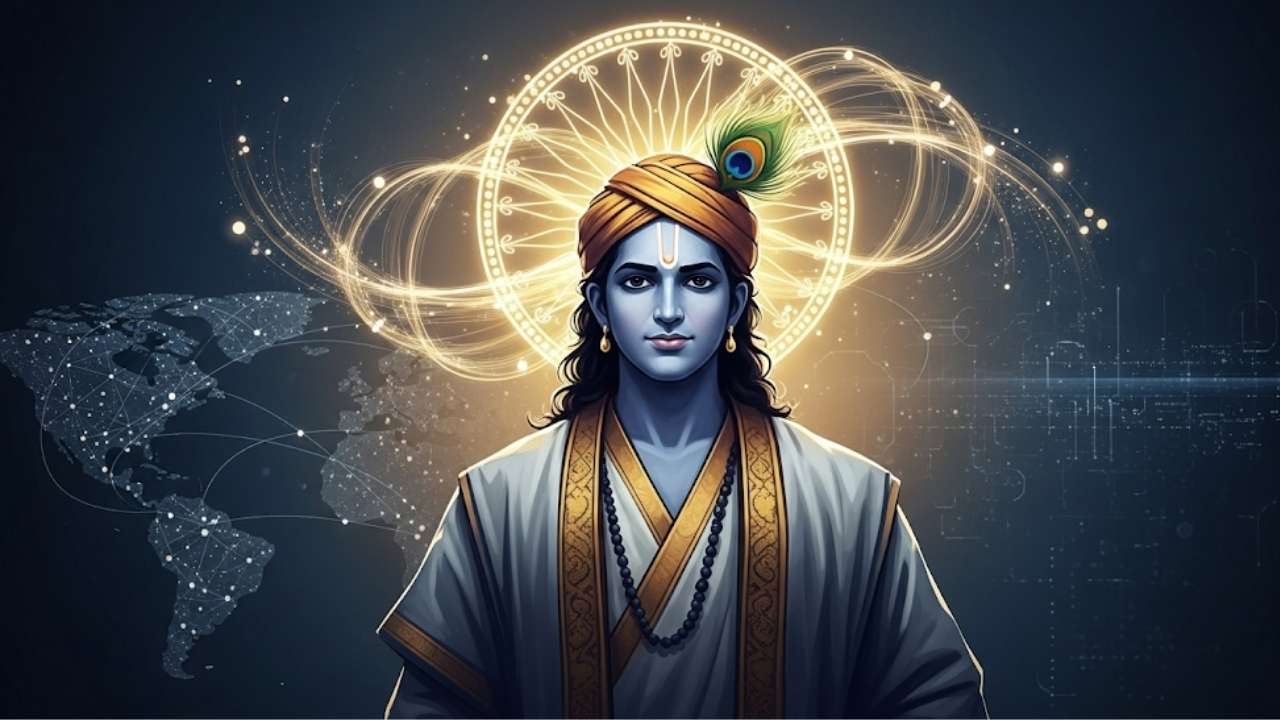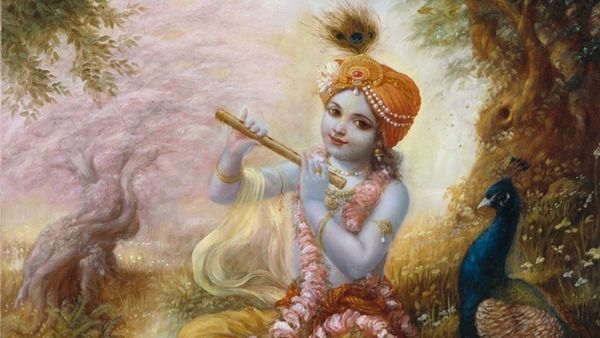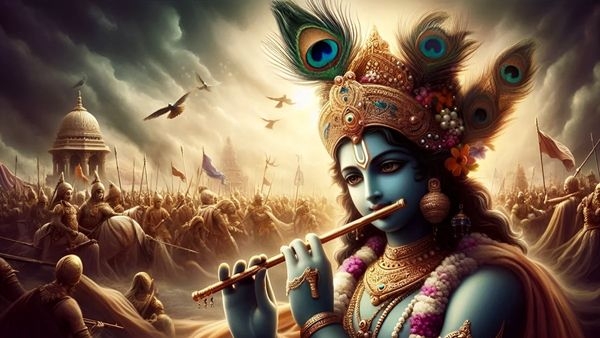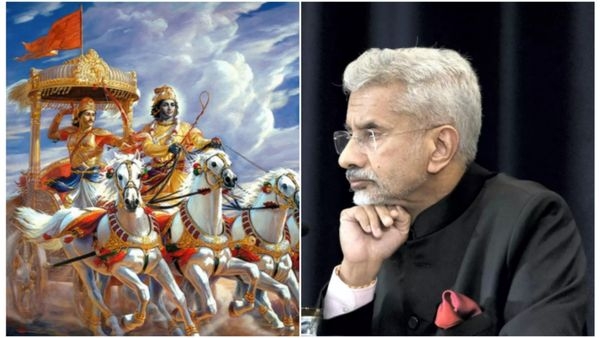Lord Krishna’s Strategic Wisdom, Krishna Neeti, for Both Individuals and Bharat
16 Aug 2025 20:15:54

Shri Krishna is one of the most widely read, most versed and most indomitable gods of Bharatiya history; he is also a very influential entity of Bharatiya literature. Where the reader and admirer may see the ideal combination of pravrtti and nivritti, activity and detachment. Shri Krishna is the foremost of acharyas, for he practised what he preached and established the ideals he espoused in tradition.
Humans rarely live up to their ideals, nor do they elucidate their thoughts for the benefit of posterity. And Shri Krishna differs on both these counts: his life is the best exposition of his teachings enshrined in the Bhagavad-Gita. And his character too appears to have an apparent contradiction — difficult to understand completely and yet easy to experience!
Looking towards the paradoxical life of Shri Krishna, he was not a king but went on to become a kingmaker; he was not a celibate per se, but he practised the highest level of detachment; he was a great warrior but did not fight in the Battle of Kurukshetra. He was not a Vedic seer but produced a work that stands on par with the Vedas. In the words of Kulapati K.M. Munshi, he was “wise and valorous, loving and loved, far-seeing and yet acting in the living present, gifted with sage-like detachment and yet intensely human; a diplomat, a sage and a man of action with a personality as luminous as that of a divinity”.
Lord Krishna’s Teachings on Life

1. Focus on your actions, not the outcome. Enjoy the journey of reaching your goal, rather than just obsessing over the destination.
2. Everything happens for a reason. What happens, happens for the best. Instead of getting upset about everything, learn to accept every event and learn to let go of bad experiences.
3. Live in the present moment. Krishna was a god, so he knew what would happen in the future. But even then, he lived in the present and made plans accordingly. So, instead of worrying about what will happen tomorrow, enjoy what you have today.
4. Abandon anger, greed, and ego. Krishna said that these three are the gateways to hell. Therefore, give up these bad habits and embrace peace in your life.
5. Be ready to make sacrifices. Krishna made sacrifices throughout his life because nothing is achieved without it. To move forward in life, be prepared to give up your comfort, money, time, and sense of security.
6. Stay humble. Krishna was the king of Dwarka and a great warrior; he had everything, yet he remained humble and always tried to bring happiness to others. You should do the same because, without humility, even the greatest success is worthless.
7. Respect your work. Even though Krishna was a god, he became Arjuna’s charioteer in the Mahabharata war. This teaches us that no work is big or small, and you should always love your work.
8. Cherish true friends. In today’s world, very few people find good and true friends. If you have such friends, cherish them like Krishna, and in return, always be there for them.
Lord Krishna’s Policies on Political Strategies

Be clear about who is on which side: Krishna emphasised that before a conflict, it should be clear who stands for righteousness (dharma) and who stands against it (adharma). This clarity prevents confusion and ensures you are fighting for a just cause.
Agreements can be broken if they harm the nation, truth, or religion: the article points out that Krishna, despite his own vow not to use weapons, broke it to protect dharma. This shows that certain rules or agreements may need to be disregarded if upholding them would harm a greater good.
Use diplomacy against powerful enemies: when facing an overwhelmingly powerful adversary, it’s smarter to use diplomacy and strategy rather than direct confrontation. Krishna used this approach to have powerful foes defeated by others, avoiding a direct battle.
Courage and timing matter more than numbers: victory is not determined by the size of an army but by courage, strategy, and the right use of resources at the right moment. The Pandavas, despite being outnumbered, won the war due to Krishna’s wise policies.
Value every soldier: A good leader protects and values the life of every individual under their command. The Pandavas, led by Krishna’s guidance, looked after their warriors, which helped them secure victory.
Do not hesitate to defeat the unrighteous: When you have an opportunity to overcome an enemy, act immediately and decisively. Delaying can allow the enemy to recover and pose a greater threat later.
Do not trust the neutral: The article states that those who remain neutral in a conflict between dharma and adharma are also held accountable. You can only truly be on the right side by actively supporting truth and justice.
Seek knowledge even in the heat of battle: even during the intense Mahabharata war, Krishna delivered the knowledge of the Bhagavad Gita. This teaches that you should continue to seek knowledge and maintain a clear mind even when faced with life’s biggest challenges.
Have a plan: Krishna lived a disciplined life and planned his actions carefully. This shows the importance of having a clear plan and living in the present, not getting bogged down by unnecessary worry.
Conquer fear: Krishna taught that you should not lose courage in times of crisis or failure. By understanding the reasons for failure and moving forward without fear, victory becomes possible.
Lord Krishna’s Influence on Bharat’s Foreign Policy

Bharat’s foreign policy is inspired by Krishna’s life, a point mentioned by Bharat’s External Affairs Minister, S. Jaishankar, in his book, The Bharat Way: Strategies for an Uncertain World.
“Krishna embodies pragmatism, strategic foresight, and the art of balancing ideals with realpolitik. His diplomacy in the Mahabharata — whether as a messenger of peace, a master strategist in war, or a guide offering clarity in moments of doubt — offers timeless lessons for statecraft.”
Bharat’s foreign policy reflects this ethos by blending moral values with national interest. Like Krishna’s counsel to Arjuna, Bharat seeks to act with dharma (righteousness) while remaining practical in an uncertain world. This balance is visible in Bharat’s pursuit of global partnerships, non-alignment with rigid blocs, and emphasis on dialogue over conflict, while safeguarding sovereignty and security. Krishna’s legacy thus endures as a guiding light in Bharat’s strategic thinking.
Article by

Kewali Kabir Jain
Journalism Student at Makhanlal Chaturvedi National University of Journalism and Communication